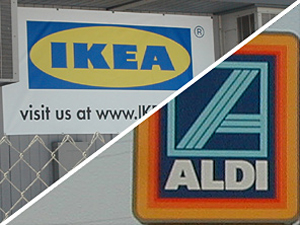|
Audio
Photos
Resources
Your Voice
|
European chains set sights on Minnesota consumers
February 22, 2004
Retail experts say most Minnesotans are comfortable in their shopping habits -- the weekly trips to Target, the "I Love My Cub" decals on our cars, the familiar chains of home furniture stores. But in coming months some retailers from Europe promise to shake things up. The IKEA and Aldi chains are already generating consumer buzz for their approaches to home furnishings and food.
Bloomington, Minn. — It might seem strange to get all worked up over a big, empty building. But this quiet spot in Bloomington is already inspiring people to draw up new plans for their living rooms. The blue and yellow hulk rising next to the Mall of America will open this summer as only the second IKEA in the midwest.
The Swedish home furnishing store has the floor space of three regular Targets. It could pull in as much as $100 million a year -- the equivalent of a $20 bill from every man, woman and child in Minnesota.
Since moving from Baltimore in 1991, Cottage Grove resident Lauri Mueller has been hoping for IKEA to come to town.
 | |||
"It was almost like going to Europe when you went to IKEA," she recalls. "You're experiencing a different culture, and maybe seeing how they do things better."
Mueller says low prices are part of IKEA's charm. How about a dining room table and four chairs for $130? The company's philosophy is stylish furniture for ordinary people -- a legacy of Swedish egalitarian values, according to a spokesman.
Mueller says she's also attracted to the designs themselves, all of which are done in-house by IKEA. "Very sleek and simple, like a typical Scandinavian design is," she says. "It's very clean and European."
IKEA has not entered a new U.S. market in more than four years. But the company believes Minnesota's Nordic ethnic roots make for a good fit, and it already has 67,000 registered customers in the Twin Cities. Most wound up in IKEA's computers after shopping at IKEA's other Midwest location near Chicago.
The company attracts attention for some unusual business practices. Customers get free child care while they're in the store. Part-time employees are eligible for medical insurance and maternity leave. And to make its products, the company often looks for unused materials and struggling communities in the third world.
"We establish a great working partnership with them that keeps the supplier in business, and also maximizes resources that might otherwise have been wasted," says company spokesman Joseph Roth.
 | |||
For example, left-over wood from Mexican lumberjacks becomes sofa legs; an IKEA rocking chair is made of cast-off banana leaves from Asia.
Efficiency is also -- in a very different way -- a top priority at Aldi. Aldi (it's pronounced ALL-dee), the "deep discount" grocery chain from Germany, has opened four Twin Cities stores in recent months, with more to come.
Aldi is less than half the size of a typical grocery store, a feature that lets Aldi move in where the big boxes can't. Walk down the aisle and look around for your favorite brands -- you probably won't find them. Aldi food is mostly private label, with unfamiliar names like Nature's Nectar, Happy Harvest and SaladMate.
This doesn't sit well with Mark Chergosky, who lives nearby and stopped by a recent Aldi grand opening in Little Canada.
|
There is going to be a 'battle royale' as we move forward.
- Dave Brennan, University of St. Thomas |
"We probably won't stop here very often," says in the parking lot. "They don't have the brands that we're used to. I've never heard of Millville Corn Flakes."
Chergosky is cradling a bundle of food in his arms -- he also didn't like having to pay for grocery bags. The company says it wants to encourage recycling. But the practice also matches the stripped-down image: Limited selection, no fancy displays, few staff members roaming the aisles.
All in the name of price.
"I thought the store was phenomenal," says nearby resident Philip Moore. "The prices are much better, the food even tastes better."
Moore didn't just stop here on a whim. He used to shop at Aldi when he lived in Illinois.
"I've been waiting," he says. "Patiently. For a long time."
Retail expert Dave Brennan from the University of St. Thomas says Aldi will certainly pull price-shoppers from places like Cub and Rainbow.
"There is going to be a 'battle royale' as we move forward, and I think it will be very interesting to see what happens with Twin Cities shoppers who have gotten pretty comfortable with the options out there," Brennan says.
Some shoppers are salivating over yet another grocery possibility. Rumors have circulated for at least a year that Trader Joe's is eyeing the Twin Cities. The store's nautical theme and deals on specialty foods would tempt a more upscale crowd from chains like Lund's and Kowalski's. Trader Joe's is owned by the same German company that owns Aldi.
|
News Headlines
|
Related Subjects
|

